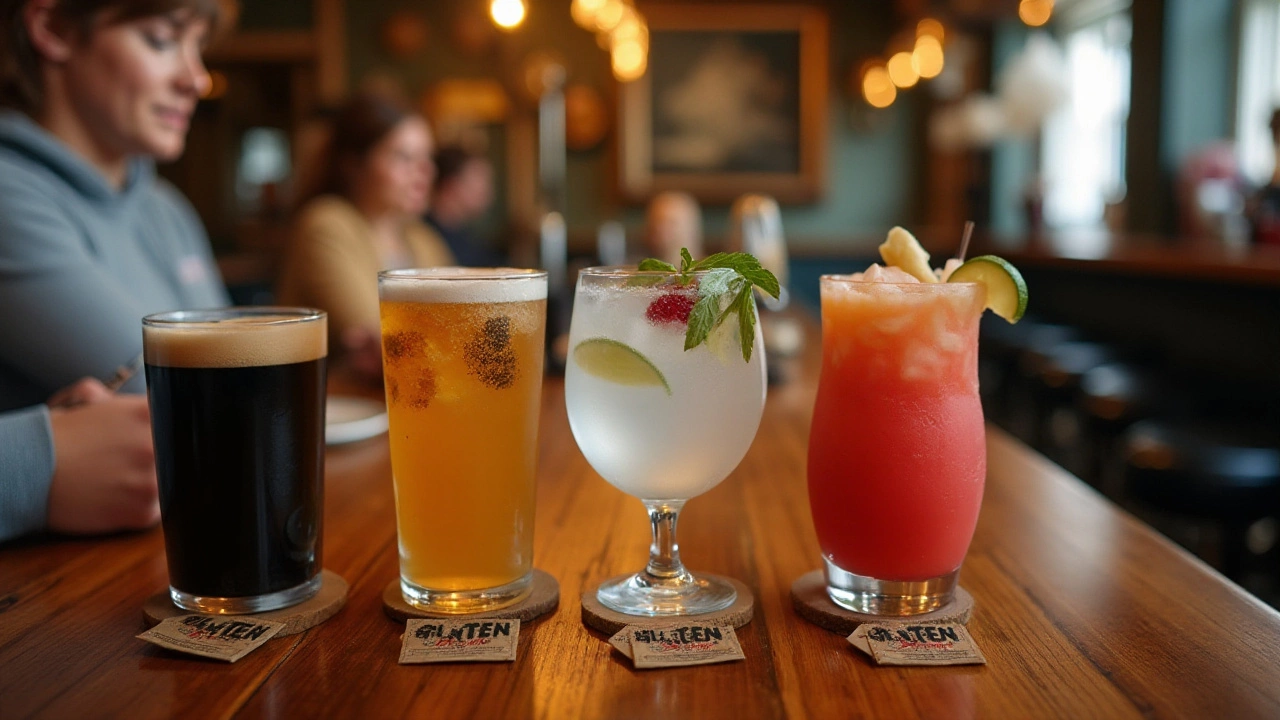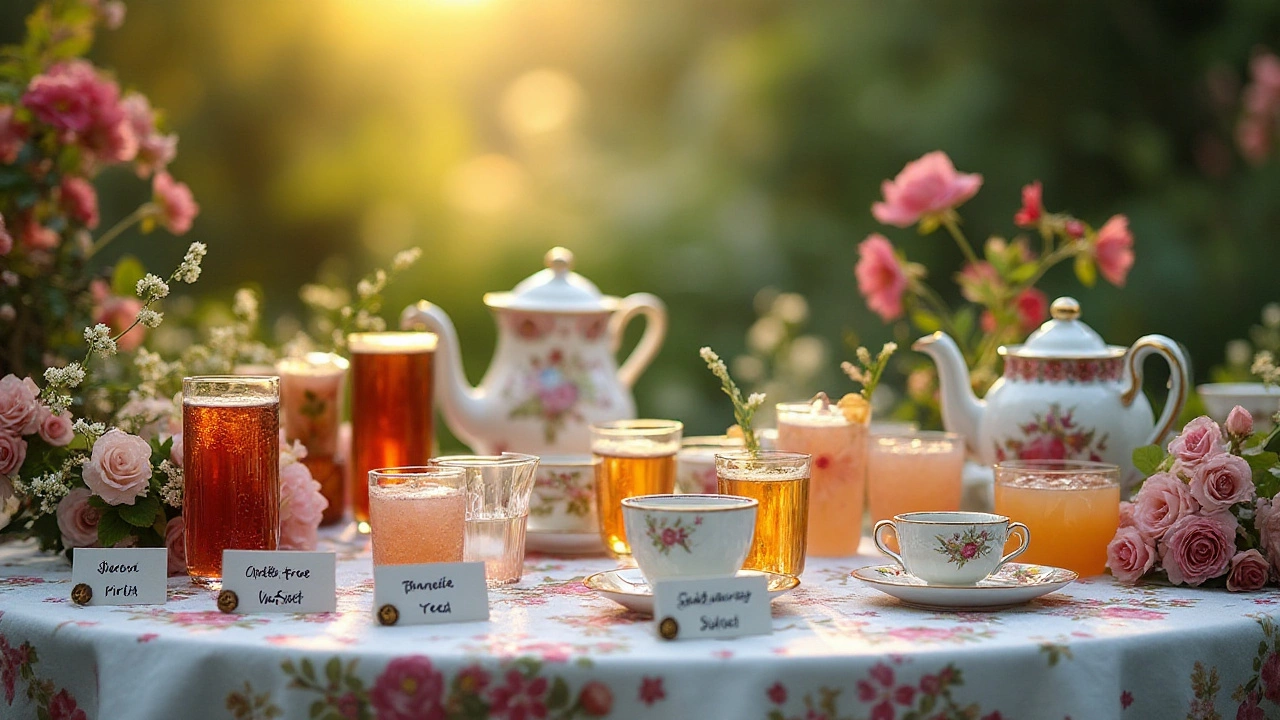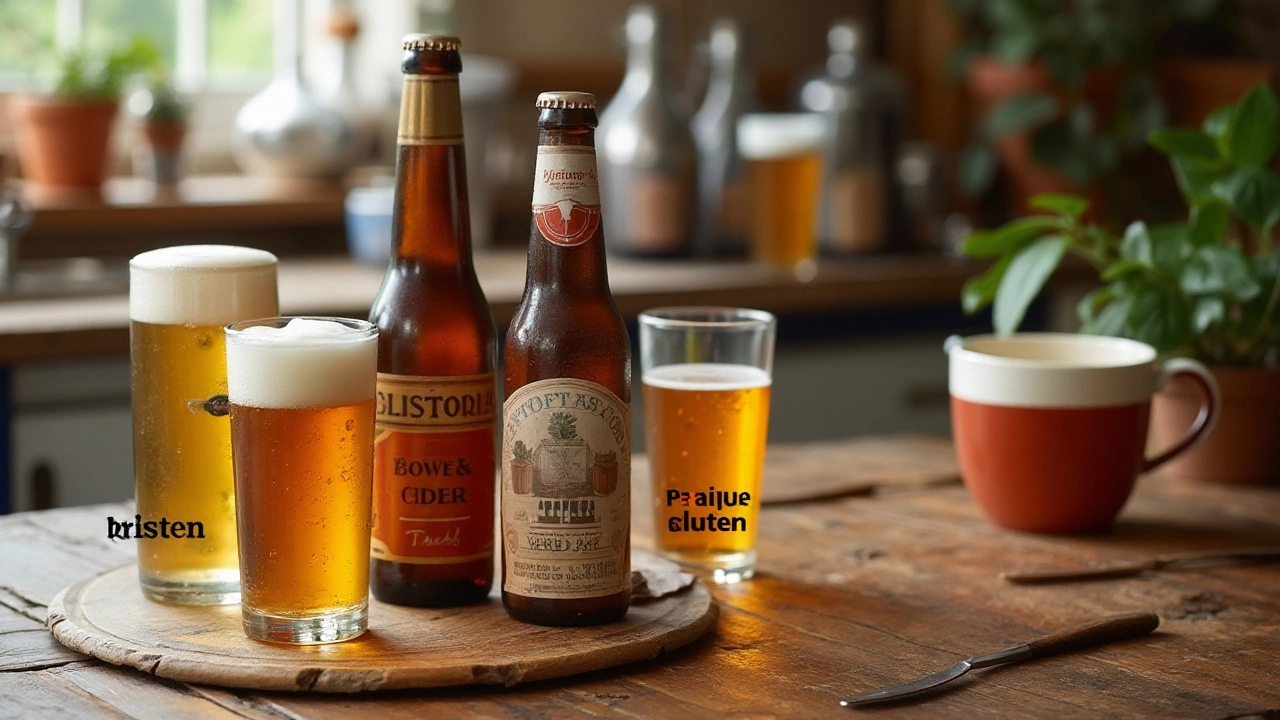Whether you're newly diagnosed with a gluten intolerance or have been maintaining a gluten-free lifestyle for years, knowing which drinks contain gluten can be somewhat tricky. While many are cautious about food ingredients, drinks often glide under the radar.
No one wants to be blindsided by gluten where they least suspect it. Grabbing a quick drink without pondering over its ingredients might feel harmless, but there are a few surprises lurking in the drinks aisle.
Explore this guide as it spills the beans on what to sip and, more importantly, what to skip. With accurate information and useful tips, you can confidently navigate the world of beverages without letting gluten-filled drinks ruin your day.
- Understanding Gluten in Beverages
- Alcoholic Drinks with Gluten
- Non-Alcoholic Drinks to Caution
- Hidden Ingredients to Watch For
- Tips for Staying Gluten-Free
- Alternative Gluten-Free Drinks
Understanding Gluten in Beverages
Let’s begin with understanding gluten drinks and why they might sneak into your diet unnoticed. While gluten, a protein found in grains such as wheat, barley, and rye, is often associated with baked goods, it can also find its way into a surprising range of beverages. This can be due to ingredients used in production, flavorings added later, or even cross-contamination during processing. Given the growing popularity of gluten-free diets, it's problematic that drinks remain a shadowy area where gluten can lurk undetected.
Alcoholic drinks, in particular, have complex brewing and distillation processes that make them potential culprits for gluten presence. For instance, beer is typically brewed with barley, making it a no-go for those on a gluten-free diet. While there are gluten-free beers on the market, it's important to bear in mind that not all are created equal. Some beers designated as 'gluten-removed' or 'gluten-reduced' may still contain trace amounts that aren't suitable for those with celiac disease or severe gluten intolerance.
An authority like Tricia Thompson, a well-respected dietitian in the field of gluten-free diets, has mentioned,
"Alcohol distilled from gluten-containing grains is actually gluten-free because the distillation process removes the gluten proteins."It's crucial to grasp this distinction as many individuals mistakenly avoid all distilled spirits, like vodka or whiskey, which are typically safe post-distillation even if made from grains containing gluten. However, flavored liquors that have ingredients added post-distillation may still pose a risk.
Non-alcoholic drinks also pose their own set of challenges. While one may assume they're naturally gluten-free, drinks like malted beverages, certain energy drinks, and even some sodas might contain gluten. This is often a result of additives, colorings, or natural flavorings that incorporate gluten. Indeed, malt is derived from barley and is a sneaky culprit found in many seemingly safe things like malt vinegar or malt beverages.
Studies reveal the importance of brands having clear gluten-free labeling to help consumers make informed choices. It's advisable to check the ingredients list and look out for certifications from trusted gluten-free labeling organizations. Sometimes companies release updates on their ingredients, making it vital for consumers to stay informed.
To assist you further, here's a table listing beverages that commonly contain gluten and their gluten-free counterparts:
| Category | Contains Gluten | Gluten-Free Option |
|---|---|---|
| Beer | Lager, Ale | Gluten-Free Beer |
| Spirits | Flavored Vodka | Plain Vodka |
| Non-Alcoholic | Malt-based Drinks | Fruit Juices |
Understanding these nuances ensures that you remain vigilant not only about the foods you eat but also about the drinks you choose. It's about embracing curiosity and intelligence when navigating your path to a gluten-free lifestyle while enjoying your favorite beverages without unwelcome surprises.
Alcoholic Drinks with Gluten
Diving into the world of alcoholic beverages can be an adventure in itself, but for those adhering to a gluten-free lifestyle, it carries its own set of challenges. Many popular alcoholic drinks contain gluten, primarily because they are derived from grains like barley, wheat, and rye. Beer, for instance, is one of the most common culprits. Traditional beers are packed with barley malt, which is a no-go for anyone avoiding gluten. While some craft brewers have introduced gluten-free beers made from sorghum or rice, caution is still advised. It's always best to look for the certified gluten-free label before indulging.
Beyond beer, whiskey and other spirits distilled from gluten grains should also be taken into consideration. Although distillation is supposed to eliminate gluten, there are mixed opinions on whether the finished product is entirely safe for sensitive individuals. Again, seeking brands that pride themselves on being gluten-free can provide peace of mind. On the wine front, it's mostly good news. Wines are typically made from grapes, meaning they naturally avoid gluten. However, one must watch out for flavor-infused wines or those stored in wooden barrels sealed with wheat-based paste.
There are several measures you can take to enjoy your drink under the sunny sky without worry. Keep an eye out for certain cocktails, which may include ingredients such as beer or malted syrups. Read the menu carefully and when in doubt, ask the bartender. While traveling, it's useful to research local drinks, as some regions might have different methods of brewing or distilling that incorporate gluten-containing elements.
"Being educated about ingredients and preparation methods can be a game-changer," says Sarah Shields, a well-known nutritionist specializing in food sensitivities. "Always remember, knowledge is power in maintaining your gluten-free journey."

Non-Alcoholic Drinks to Caution
When navigating the plethora of non-alcoholic beverages, the presence of gluten can often lurk in unsuspecting places. Sodas, juices, energy drinks, and more — while seemingly safe, can sometimes harbor ingredients that make them off-limits for a gluten-free lifestyle. For starters, malted beverages, such as malted milkshakes and malta, are obvious culprits. Malt is derived from barley, a grain known for its gluten content, and thus, these drinks must be approached with caution.
Especially for energy drink enthusiasts, the vigilance needs to extend beyond the sugar and caffeine levels to ingredient lists. Some energy drinks use barley malt as a sweetener, becoming a hidden source of gluten. For instance, those bursts of blackcurrant or citrus flavor might need more scrutiny. Additionally, certain flavored coffees and teas could contain gluten. These are often sweetened with flavorings or thickeners derived from gluten-containing grains, enhancing flavor but rendering them unsafe for those avoiding gluten.
Surprising as it might sound, even root beer traditionally brewed with sassafras root can sometimes be processed in a way or contain additives that introduce gluten. The process of carbonating drinks, or adding sweeteners and preservatives, opens potential doors to gluten sneaking in. Noteworthy is a study conducted by a group of food scientists highlighting that drinks with caramel coloring, modified food starch, or certain syrups can potentially contain gluten, although this largely depends on the manufacturing process.
Celiac Disease Foundation mentions, "Even small traces of gluten in your diet can be harmful if you have celiac disease or non-celiac gluten sensitivity." While not universally applicable, it illustrates the caution gluten-avoiders must exercise when reaching for a beverage.
One would assume sports drinks would be free from gluten complications; however, this isn't always the case. Additives and flavorings can sometimes contain modified food starch, which may come from wheat. The inclusion of hydrolyzed protein also poses a gluten risk. Although many sports drink brands are now specifying gluten-free on their labels, checking every time remains prudent.
To make wise choices, labeling becomes a close ally. Many manufacturers have acknowledged the importance and now mark their drinks as gluten-free wherever applicable. Still, learning key ingredients and understanding their potential sources provide a substantial safety net. Online resources, community discussions, and apps dedicated to cross-checking ingredient lists can also serve as vital tools in maintaining a gluten-free diet while enjoying flavorful gluten beverages.
Hidden Ingredients to Watch For
In the quest to stay gluten-free, it's crucial to be vigilant of hidden ingredients that may sneak into our beverages, often disguised with names that don't scream gluten at first glance. One of the primary culprits to be wary of is malt, frequently derived from barley, which is packed with gluten. Malt is commonly found in flavored beverages, certain sodas, and malted milk drinks. While at a supermarket, scanning the ingredient list for malt should become second nature to ensure you're not inadvertently imbibing gluten.
A sneaky ingredient that might catch even the most diligent gluten avoiders off guard is modified food starch. This sneaky ingredient sometimes crops up in soft drinks and certain mixers. Although often made from corn, it can also be derived from wheat, turning what seems like a gluten-free drink into a gluten-filled one. It's a good practice to reach out to manufacturers directly if the source of modified food starch isn't specified on the label, a step recommended by nutritional experts for clarity.
Flavorings, whether natural or artificial, add another layer of complexity. These are often used to enhance the taste of beverages ranging from sodas to cocktails. Notoriously vague on packaging, they can sometimes be derived from gluten-containing grains. The tricky part is that not all gluten sources need to be declared on the label, making flavorings a potential minefield. A reliable tip is to stick with beverages clearly labeled as gluten-free or from brands that publicly disclose their ingredient sources.
Avoiding gluten in drinks also means looking out for colorings and caramel in beverages like colas and certain liqueurs. Caramel coloring can be made from barley malt, a less obvious source of gluten that hasn’t lost its potency. Dr. Joseph Murray, a gastroenterologist at the Mayo Clinic, often points out the importance of vigilance, "Even a small amount of gluten can trigger symptoms for those highly sensitive or intolerant." His advice encourages taking a proactive approach in scrutinizing ingredients.
It's not just warmth and taste additives that could lead one astray. Stabilizers and emulsifiers sometimes sneak into drink mixes and are often overlooked. Lecithin, for example, can be derived from both soy and wheat; however, when it's sourced from wheat, gluten-exposure becomes a concern. Armed with knowledge, one can opt for certified gluten-free alternatives where possible.

Tips for Staying Gluten-Free
Deciding to maintain a gluten-free lifestyle is a commendable journey, but it certainly presents its own set of challenges, particularly in the realm of beverages. It's not just about the obvious gluten-laden beers or certain rye whiskeys; surprises can sneak up in places you might not suspect. To help navigate this intricate landscape, it's crucial to embrace a double-check mentality. One solid piece of advice is always reading ingredient labels with an eagle eye and understanding what each term implies. Terms like malt or hordeum vulgare might seem harmless, yet they often indicate gluten presence, lurking in the guise of unfamiliar names. Being savvy with the label lingo is your first line of defense against unexpected gluten encounters.
Another cornerstone of staying gluten-free involves adeptly wielding the power of technology. Today, numerous apps can scan barcodes and offer insights into whether a drink contains gluten. Often laden with user reviews and updated databases, these apps can be the mobile guide you need, fitting snugly into your pocket. Furthermore, the advent of online communities and forums provides an additional layer of support. Connecting with others navigating similar paths can offer invaluable insights beyond what ingredient lists convey. It's not uncommon to stumble upon personal anecdotes or tricks that could greatly enrich your gluten-free journey.
Celiac disease expert and author of Gluten-Free Living for Dummies, Danna Korn, notes, "The greatest tool we possess is informed choice. Never underestimate the power of questioning and researching to protect your health."
In the quest for a truly gluten-free beverage roster, establishing trusted brands is another pivotal strategy. Certain beverage manufacturers dedicate themselves to providing safe, gluten-free options and adhere to stringent testing methods to ensure quality. By frequenting these brands, you can alleviate some of the anxieties surrounding drink selections. Gluten drinks can be quite sneaky, but opting for well-reviewed and certified brands curtails the chances of an unwelcome encounter. Still, it's prudent to request transparency regarding preparation processes or potential cross-contamination, especially with smaller brewers or homemade concoctions.
Engaging with the producers and sellers of beverages isn't as daunting as it sounds and often delivers peace of mind. Conscientious producers will be forthright about their ingredients and practices. Similarly, local sellers might accommodate requests for ingredient lists or nuanced labels. Knowing how to inquire appropriately and appreciate honest disclosures is a refined skill when ensuring your drinks are safe to enjoy. In essence, it's about proactive diligence in one's choices and making strategic inquiries.
Lastly, never underestimate the power of traditional knowledge. Keeping a journal or log of what works helps reinforce safe choices while avoiding repeated slip-ups. A personal archive can become a valuable reference over time, especially when experimenting with new drinks. As you become attuned to your body's responses and reference your experiences, you build an evolving personal repository of gluten-free suavity. This empowers not only savvy decisions today but fortifies future selections with informed intuition.
Alternative Gluten-Free Drinks
Finding gluten-free drinks that also taste great and quench your thirst can be a thrilling journey. There is a diverse range of beverages, from fruity refreshments to exotic brews, that not only meet dietary restrictions but also delight your taste buds. It's not just about avoiding gluten—it’s about discovering a new world of flavors. One popular choice is the classic fresh fruit smoothie. Packed with nutrients and vivid colors, these homemade delights allow for endless creativity with ingredients, ensuring you never get bored of the same blend. The natural sweetness of fruits combined with yogurt or milk alternatives creates a velvety texture and a hint of indulgence without a gluten concern.
For those who enjoy a bit of fizz in their cup, various gluten-free sparkling waters and seltzers are increasingly available. With a variety of natural flavors, they provide a guilt-free, zero-calorie option for staying hydrated. It's exciting how brands are constantly innovating, delivering a splash of mango or a tinge of lemon-lime to invigorate your senses. The delightful effervescence paired with subtle fruit flavors can liven up any gathering or be the perfect companion for a good book on a lazy afternoon. According to Statista, the sales of sparkling water are projected to reach a whopping $6 billion by 2025, showcasing consumer demand for healthier and exciting beverage options.
For tea lovers, loose leaf teas offer a serene escape into nature's bounty without the hidden danger of gluten. Brewed with herbs, flowers, or spices, these infusions can offer both health benefits and a sensory feast. From calming chamomile to invigorating peppermint, each cup is an adventure in flavor and wellness. As tea connoisseur Michael Harney once said,
“Tea is quiet and yet exhilarating; it warms the heart and cools the mind.”With that spirit, wandering through the variety of tastes and aromas can become a cherished ritual for the gluten-free enthusiast.
For something more exotic, yerba mate and kombucha are worth exploring. Both have gained loyal followings for their bold flavors and potential health benefits. Kombucha, a fermented tea, carries a unique tartness aided by its natural probiotics. Yerba mate, with its earthy and slightly bitter profile, has become the darling of many who seek a caffeine boost outside traditional coffee. Both hold deep cultural roots, offering a taste of history with every sip. Companies like GTs and Guayakí have brought these beverages to a global audience, maintaining traditional essence while making them easily accessible.
Dairy alternatives such as almond, oat, and coconut milk have expanded boundaries for what a non-dairy latte or smoothie could be. Not only do they cater to lactose-intolerant individuals and vegans, but they also naturally eschew gluten. The creamy texture and rich taste of these non-dairy options complement coffee, enhancing the beverage without overshadowing the gluten-free experience. Whether you desire a frothy cappuccino or an iced matcha latte, the range of alternatives on supermarket shelves today ensures you never have to compromise on flavor or dietary needs.
For those with a sweet tooth, freshly pressed juices curated to perfection serve as a revitalizing, gluten-free treat. This might be a concoction of green veggies or a berry-rich mixture; either way, cold-pressed juices are celebrated for their vitality and potential health benefits. Packed with vitamins and antioxidants, a well-chosen juice can be both satisfying and nourishing, adding a colorful splash of nature's bounty to your diet without a hint of gluten. The joy of a tangy-sweet apple juice blend or a garden-fresh green juice invigorates the senses, making you feel energized and wholesome.

